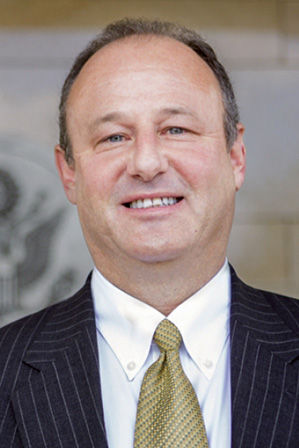Reform for a New Year
President’s Views
BY ERIC RUBIN

We are marking the one-year anniversary of the Biden-Harris administration this month, with little progress to show on the ambitious agenda of urgently needed reforms of our Foreign Service. Secretary Blinken’s Oct. 27 speech on the modernization of American diplomacy is a welcome step, but we need to see action and implementation, and the speech touched on only a few Foreign Service reform priorities.
One cause of the delay is the continuing spate of vacancies in key leadership positions in all the foreign affairs agencies, a problem that stems both from blanket holds on nominees by certain senators as well as the painfully slow pace of nominations by the White House.
There should be nominees for every Senate-confirmed position, and the Senate should have confirmed (or voted down) most of them. Instead, nearly one-third of confirmable foreign affairs leadership positions do not have nominees. And as of this writing, dozens of nominees are awaiting a confirmation hearing, a confirmation vote or both.
The lack of a confirmed Under Secretary of State for Management and Director General of the Foreign Service is a barrier to progress. The urgency is growing: There is a fairly strong bipartisan consensus in both houses of Congress in favor of additional funding, but without an FY 2022 budget and confirmed officials in key positions, we are unlikely to see significant forward movement in the coming months.
AFSA is committed to an all-out effort with both the executive and legislative branches to make the needed changes to our 97-year-old Service and our 41-year-old governing legislation. Reform cannot wait.
It is an old cliché that morale is never good in the U.S. Foreign Service, but there is ample evidence that it is lower now than it has been in at least 40 years, possibly the lowest since the fall of South Vietnam and the Iran hostage crisis. That is certainly my assessment as I complete my 36th year in this career.
We are grateful for all of your ideas and suggestions. We hear you.
The reasons are legion and have been amply documented in the superb reports issued last year by Harvard’s Belfer Center, the Council on Foreign Relations, the Carnegie Endowment, the Truman Center and other think tanks. We can’t fix everything, and the list of needed changes and reforms is long. We need to set clear priorities. That is where you, our members, come in.
Our primary goal is to serve our members in every way we can. We are grateful for all of your ideas and suggestions. We hear you. We will be doing additional member surveys to hear your concerns, but nothing is more helpful than individual communication. You can reach us collectively at member@afsa.org, or email us personally at the addresses listed on www.afsa.org. My address is rubin@afsa.org.
During the past two years, we have all been through a wrenchingly sad and painful time that is not yet over. The pandemic has changed all our lives and, indeed, the lives of everyone across the globe.
Some things have not changed, however: the courage, dedication and commitment to service of our colleagues; the importance of diplomacy as the alternative to war and the human suffering it brings; and the need to do more to support our colleagues so that they, and their families, continue to see this career as both rewarding and flexible in today’s world.
We can’t do it without you. Please consider not only sending us your ideas and concerns, but also volunteering to become AFSA post representatives, participating in our speaker programs, writing letters to the editor and op-eds, and working for change through employee affinity groups, social media groups and your own personal networks. We also strongly encourage you to run for the AFSA Board in 2023.
America needs a stronger, healthier, more effective Foreign Service. We can’t wait for others to lead the effort. Together, we can help make it happen. When faced with slow progress and disappointment, our answer must be to press harder—beginning now, at the start of a new year.

